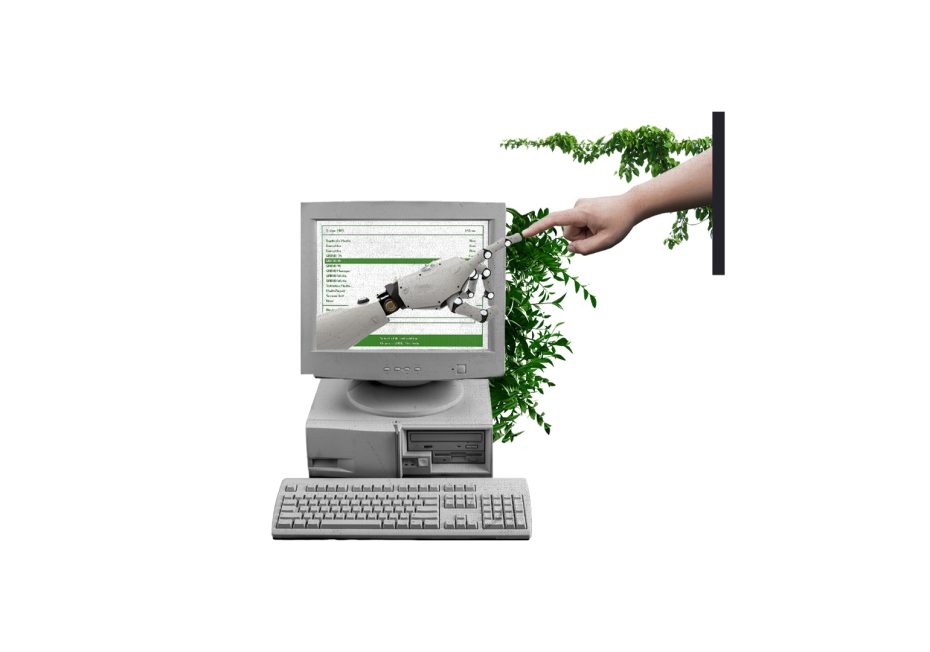Snarky and slightly disturbing journey through the realm of AI, where immortality and extinction collide in a dystopian (or utopian?) debate.
Disclaimer: no robots were harmed (or used) in the making of this piece (check here).
What We’ll Be Covering
- The AI Renaissance: A Brief History of Time
- The Miracles of AI: A Shot at Immortality?
- The Dark Side of AI: A Prelude to Extinction?
- Regulatory Measures: The Middle Ground?
- So, What on Earth Does This All Mean?
Let’s play a game: it’s called ‘Immortality or Extinction?’
Here’s the deal: we’ve created an unholy brew called Artificial Intelligence (AI). It promises to revolutionize our world, either leading us to a future of immortality or, oh, I don’t know, outright extinction.
Charming, isn’t it?
AI is changing the game on a scale that could make the Industrial Revolution look like a dress rehearsal for a school play. Remember when the electricity went from being a curiosity to a life-altering force that permeated every aspect of our lives?
AI is the new electricity, with the potential to redefine what it means to be human.
But, as they say – with great power comes…well, a lot of confusion actually.
So, let’s get up close and personal with this new digital beast, and ask the million-dollar question – is AI our golden ticket to living forever or the express train to the end of humanity?
Oh, the drama!
The AI Renaissance: A Brief History of Time
Before we delve into the future, let’s rewind a bit.
Picture the scene: a vast landscape filled with the hustle of the Agricultural Revolution.
Now, fast-forward through time to the buzzing cities of the Industrial Revolution.
Okay, got that? Good. Now, smash them together, sprinkle in some quantum computing and Big Data, and you’ve got the AI revolution.
This isn’t just about Siri ordering pizza for you anymore.
No, we’re talking a total overhaul of life as we know it, one line of code at a time.
AI in its simplest form, is all about making machines think like us – full of nuance, creativity, and occasionally, just a sprinkle of insanity.
The concept itself isn’t new, and certainly not the invention of some geeky kid in a garage. The term AI was coined in 1956 by John McCarthy (one of the “founding fathers” of artificial intelligence), a man obviously in love with the future. He and his merry band of visionaries dreamt of machines mimicking human intelligence.
But, well, a reality proved a bit trickier than they thought.
The AI world went through a series of “AI winters,” a time when optimism about AI froze over due to underwhelming results. But like any good drama series, AI bounced back in the 1990s, thanks to advancements in Machine Learning.
That’s the art of teaching computers to learn from experience, kind of like a digital “Circle of Life.”
Fast forward to the 2010s, and enter Deep Learning – the cool kid on the AI block. This technique models artificial neurons in layers to create an “artificial neural network” that can learn and make intelligent decisions on its own.
Over the past 5 years, we’ve observed the blossoming of AI from its cute infancy to its rebellious teenage years. Enter GPT-4, the brainchild of OpenAI.
Ai isn’t joking around anymore; it’s here to either rocket us toward unimaginable advancements or plunge us into a void of irrelevance.
So here we are, at the cusp of the greatest revolution in human history.
Stay with me, it’s going to get messy.
The Miracles of AI: A Shot at Immortality?
Like Aladdin rubbing his lamp, humanity has been vigorously polishing this AI “genie in a bottle,” and boy, is it starting to grant some astonishing wishes.
Picture your mind, your consciousness, being uploaded onto a digital platform, where you could live forever. No diseases, no aging, just an endless existence in the realm of ones and zeros.
What?! Is this really possible?!
Absolutely, no idea.
BUT here are the wishes it’s already or almost granting us.
Just stroll into the field of healthcare. AI can already detect diseases with unprecedented precision, from the big C (that’s cancer for the uninitiated) to neurodegenerative conditions.
Then there’s the field of drug discovery. With AI, you can forget about your traditional ‘lab rats’ and ‘test tubes’ approach. AI is flipping the script, promising to accelerate the time it takes to bring new drugs to the market.
Is it so outrageous to think we might see cures for previously “incurable” diseases in our lifetimes? Or that we could drastically extend our lives?
Some scientists believe we could use AI to understand human biology at such a microscopic level that we could slow down, stop, or even reverse aging.
Thanks to AI, immortality could be more than just a plotline in a sci-fi movie. If that doesn’t get you excited (or terrified), I don’t know what will.
Okay, healthcare is on fire. What about the other industries?
- Banking industry is getting a makeover – Let’s look at the oh-so-exciting (note the sarcasm) field of banking. Thanks to AI, this industry is getting a makeover. AI-powered fraud detection is making the bad guys sweat, predictive analysis is transforming investment strategies, and robo-advisors are counseling us on our finances with an accuracy of a seasoned financial advisor.
- Retail running on steroids – What about the retail sector?. AI has transformed it from a traditional marketplace into a personalized, customer-focused nirvana. Forget about the times when you struggled to find the right size or style. Now, thanks to AI, your online shopping platform knows you better than your partner. Creepy or convenient? You decide.
- Auto industry getting turbo-charged – AI-driven autonomous vehicles are so close to becoming a reality that we can almost smell the new-car (or should I say, new-robot?) scent. They’re not just set to change how we commute, but they could redefine the concept of vehicle ownership and the entire logistics industry. All this while potentially reducing accidents and improving efficiency.
It’s hard to find an industry that’s not being impacted by AI right now.
However, every coin has two sides and we must now glance into the abyss. It’s about to get real dark… real fast.
The Dark Side of AI: A Prelude to Extinction?
Time for a reality check.
Let’s step out of our AI-infused utopia for a moment and glance at the shadows.
AI, while impressive, isn’t all sunshine and immortality. It’s got a dark side, and we need to talk about it.
First, let’s talk about your job.
A study by McKinsey Global Institute estimates that by 2030, one-third of all jobs could be automated. That’s about 800 million jobs worldwide. Your nine-to-five cubicle might soon be replaced by a chunk of silicon working 24/7.
But this is just the nature of innovation.
Just as the Industrial Revolution closed doors on some professions while opening new ones, the AI revolution will follow suit. Remember, once upon a time, ‘Social Media Manager’ sounded as real as unicorns. Today, it’s a legit career.
So, yes, AI might send some jobs into oblivion, but it’ll create fresh ones we can’t even fathom yet.
I like to say: “AI might not replace you, but a person using AI – will”.
But wait, who cares about job loss when you’ve got AI-powered weapons of mass destruction to worry about? Yes, autonomous weapons – think drones making kill decisions, and AI-controlled cyber warfare.
The United Nations has even convened meetings to discuss the terrifying implications of lethal autonomous weapons systems.
Plus, consider this: AI in the wrong hands. Misuse of AI technology could lead to unprecedented levels of cybercrime, espionage, and privacy invasion. It’s not just about those embarrassing photos getting leaked anymore, it’s about your entire digital life being manipulated.
Now, onto the star of our horror show: superintelligent AI. It’s like unleashing a genie from a bottle, but this one doesn’t grant wishes. If an AI system ever surpasses human intelligence, we’ll be playing Russian roulette with our species’ survival. Even the late physicist Stephen Hawking warned about AI potentially being “the worst event in the history of our civilization.”
So…what do we do?
Regulatory Measures: The Middle Ground?
Let’s not forget the trusty old governments and their knack for slapping on regulations faster than a bot can say “01001000 01101001!”
AI, in all its super-powered glory, needs a leash. It’s like a dog. A massive, terrifying, potentially world-ending dog. Governments worldwide need to (and are) lace up and start playing referee in this high-stakes game.
There’s a need for a global AI babysitter. A united front that can ensure every player in the AI game is toeing the line. In this chaos, the regulatory measures could act as a buoy. Our golden ticket to navigating the AI revolution without going extinct. Or, at the very least, it’s a decent place to start.
And this is already happening. For instance, the European Union’s been busy concocting the Artificial Intelligence Act. It’s like the Ten Commandments, but for bots: a set of rules aiming to ensure AI applications are used in a way that respects European values and principles.
No Terminator-esque dystopias for the EU, thank you very much.
The US has also been getting its regulatory engine going. The Algorithmic Accountability Act was proposed to make large companies conduct “impact assessments” of their high-risk automated systems. It’s like a school exam for AI, but instead of getting a grade, they get a “potentially destructive” or “you’re good to go” label.
And then there’s the Global Partnership on AI, a coalition of multiple countries, including Canada, France, Japan, the UK, and the US, that have committed to ensuring AI technologies are used responsibly and ethically.
So, it seems we aren’t entirely asleep at the wheel. The gears of regulations are turning, and the laws are catching up to the nonsense.
Better safe than sorry – especially when the ‘sorry’ could mean our untimely demise. But then again, who’d be around to say “I told you so”?
So, What on Earth Does This All Mean?
Immortality or extinction? Hmm?!
Weeell, probably none.
Sorry for being a party pooper but most likely we’re going to end up somewhere in the middle with enhanced life expectancy and a heavily regulated AI industry.
We don’t want to regulate it too much but we also don’t want to sacrifice too much of the progress. We still have to sacrifice some of it though.
Anyways, regulated or unleashed, this AI-driven fairy tale has barely begun, and we’ve got front-row seats. So let’s keep those fingers crossed and hope for a happy ending. And remember, if all else fails, we can always just switch the computer off…right?
Co-founder & Growth Lead at Kernel











